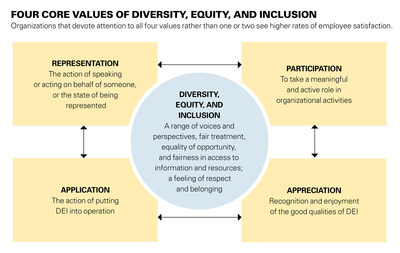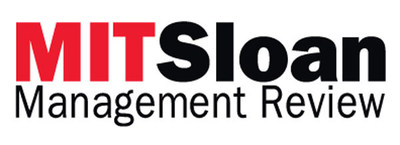Massachusetts
How a Values-Based Approach Advances DEI
A new model for developing diversity, equity, and inclusion in the organization can increase employee satisfaction.
CAMBRIDGE, Mass., June 7, 2022 /PRNewswire/ -- According to new research released today in MIT Sloan Management Review, achieving DEI isn't a linear process but rather a commitment to cultivating core values and turning guiding principles into organizational habits.
Based on surveys and field studies from companies that have demonstrated significant progress toward DEI, The values/principles model (or VPM)Â is a structured and measurable framework for transforming the workplace. It forms a belief system that guides attitudes and motivates the actions of people within an organization.
"It is the best of times; it is the worst of times, when it comes to diversity, equity, and inclusion," states Anselm A. Beach, deputy assistant secretary of the Army â Equity and Inclusion Agency, Department of the Army. "Conversations about equity and inclusion are getting lots of attention. But conversations that are not in the right context can cause frustration and misunderstanding. We aim to frame a new conversation so that no person or organization is left behind."
The values/principle model developed by Beach and coauthor, Albert H. Segars, PNC Bank  Distinguished Professor at the Kenan-Flagler Business School, at University of North Carolina at Chapel Hill, Albert H. Segars, is an opportunity for the entire organization. It is based on four values (the destination) with seven guiding principles (the directions to the destination). Included are examples from organizations such as Google, Disney, Mayo Clinic, and Marvel Comics.
Representation is rooted in the idea that diversity is an asset. When people are recognized for their individuality and unique voices, experiences become richer and more profoundly human. It encourages all to learn about and from people who are unlike themselves, and expands the capabilities of the organization, its talent pool, and the range of possible business outcomes.
Participation is a deeper engagement within each community and creates an environment in which everyone feels free to share their knowledge and is able to make contributions. Companies will cultivate a diverse array of problem solvers and generate more innovative outcomes.
Application is the most difficult value to achieve, but when achieved, organizations become more human-centered. Titles reflect what a person does, not their hierarchy. Employee identity becomes associated with talent rather than how many people they oversee. Performance is measured by individual accomplishments. Organizations that adopt inclusive designs learn to see that no customer is average and learn to service their customers better.
Appreciation is recognizing the value DEI brings, being grateful for it, and relying on it to make an organization successful. Being recognized by a team or department matters much more than a corporate award. People feel more loyalty to their work group than to the organization. Rewards should be redesigned to reflect connectedness among people and their work groups, thus highlighting inclusion.
Beach and Segars advise leaders to think about the values as what an organization may become. The seven guiding principles provide the directions to achieve this. Begin by prioritizing the following practices:
- Build a moral case.
- Encourage willful interrogation.
- Develop new mental models.
- Adopt entrepreneurial leadership.
- Ensure accountability.
- Be ambitious.
- Expand the boundary.
"Think about the values/principle model as giving your team the best tools to succeed not just for themselves but for the organization and the customers. You are offering left-handed baseball gloves to those who need them rather than forcing everyone to play right-handed and thus preventing some people from doing their best," added Segars.
DEI is not something to be delegated to a subcommittee or achieved by adding a photo to a website; it is an organization-wide effort that can become the foundation for fresh ideas and new possibilities. It is innovative, transformative, and inclusive.
The Research
Beach and Segars identified the four values and seven principles that lead to transformational change in a multiyear field study of 17 organizations that have been recognized for their innovativeness and effectiveness in DEI by multiple sources that rank businesses, including Glassdoor, Forbes, and Fortune.
In the first phase of the research, they conducted in-depth interviews with 55 executives, 33 middle managers, and 73 team members in the organizations about their diversity, equity, and inclusion goals and what they considered to be an effective path to achieve them. Analysis of these interviews yielded the values and the principles. They tested the model by surveying a diverse set of 350 employees in the same organizations, asking them to rate the degree to which the principles had been applied and values achieved. These respondents also assessed overall workplace satisfaction, which is a reliable metric for understanding how employees feel about their work environment and opportunities for advancement.
Beach and Segars validated the model further with a second round of surveys, this time of general managers from 113 Fortune 250 companies. Using the same approach as for the initial phase, they asked HR professionals in each company to recommend two respondents, one of whom identified as a member of an underrepresented population. Many companies asked for an additional pair of respondents to complete the survey, resulting in 430 total responses. The second survey confirmed the results from phase one.
The MIT Sloan Management Review (MIT SMR) article, "How a Values-Based Approach Advances DEI,"Â publishes at 11 a.m. EDT on June 7, 2022.
About the Authors
Anselm A. Beach is deputy assistant secretary of the ArmyâEquity and Inclusion Agency, with the United States Department of the Army. Albert H. Segars is the PNC Bank Distinguished Professor at the Kenan-Flagler Business School at the University of North Carolina at Chapel Hill.
About MIT Sloan Management Review
MIT Sloan Management Review (MIT SMR)Â is an independent, research-based magazine and digital platform for business leaders, published at the MIT Sloan School of Management. MIT SMR explores how leadership and management are transforming in a disruptive world. We help thoughtful leaders capture the exciting opportunities â and face down the challenges â created as technological, societal, and environmental forces reshape how organizations operate, compete, and create value.
Connect with MIT Sloan Management Review on:
Tess Woods
[email protected]
617-942-0336
![]() View original content to download multimedia:https://www.prnewswire.com/news-releases/how-a-values-based-approach-advances-dei-301562154.html
View original content to download multimedia:https://www.prnewswire.com/news-releases/how-a-values-based-approach-advances-dei-301562154.html
SOURCE MIT Sloan Management Review


